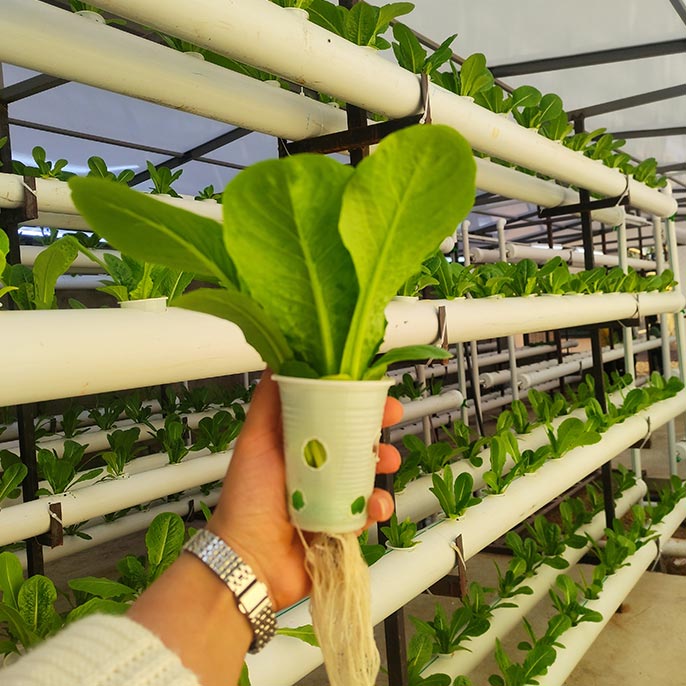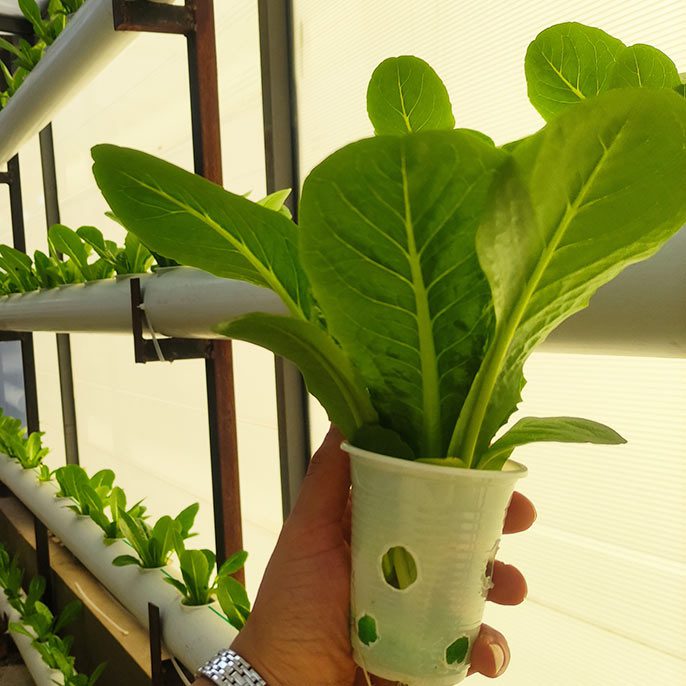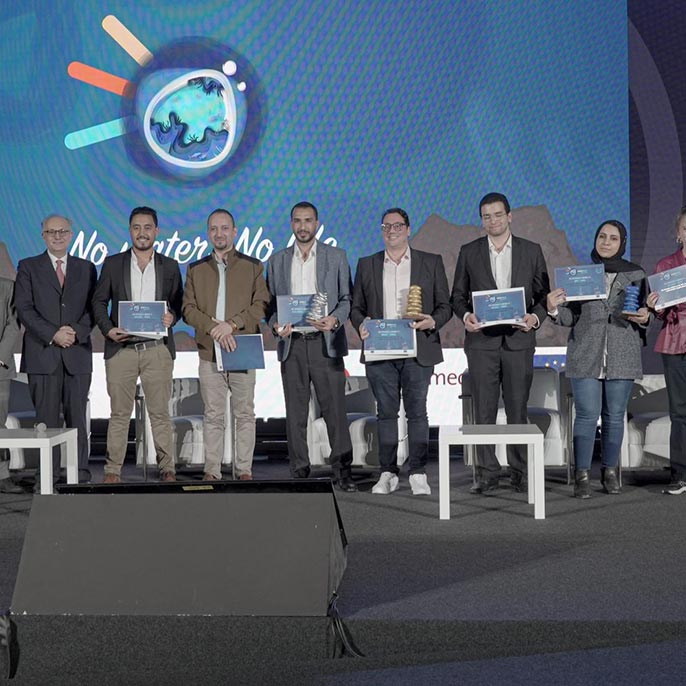Qout Libya: revolutionising agriculture through sustainable and innovative farming
Qout Libya is a local farm supported by the European Union’s #EyesonBlue and SwitchMed programmes. Created by two Libyan sisters, Fatima and SalSabeel Abu Zeid back in 2021, the farm stands as a shining example of how innovation and sustainable practices can transform the agricultural landscape in the face of climate change and economic turmoil. Through vertical farming techniques, the project optimises space utilisation, conserves water resources, and reduces carbon emissions. Qout Libya’s founders are also committed to spreading awareness of sustainable agriculture and fostering a mindset shift towards environmentally friendly practices in Libya.

Growing more with less: the benefits of vertical farming
The core principle behind Qout Libya’s success lies in its vertical farming approach. The company aims to revolutionise agriculture by producing organic and fresh produce in a sustainable and economically sound manner.
They utilise limited spaces and chemical-free techniques, thus maximising food production without relying on traditional soil-based methods. “With this technique, we only need 90 square metres to produce over 400 kilograms of produce over 25 days,” Fatima, who started the initiative at only 21 years old, explains, adding that “in addition to ensuring a very high yield, this method also minimises our carbon footprint as the food is grown inside a greenhouse, with no pesticide, pump or other harmful gas emitting device.”
Through their innovative technique, the sisters manage to counter the many problems associated with agricultural production in Libya. Indeed, in the face of climate change and economic instability, Libya has been experiencing a decline in agricultural production and a scarcity of arable lands. The country is also facing increased water scarcity, which further exacerbates the agricultural crisis.
In the midst of these difficulties, the local farm of Qout Libya is emerging as a beacon of hope. “Our entire agricultural cycle is based on the re-use of water in a closed loop, which means that no water is wasted or lost through evaporation. With just 3,000 litres of water, we manage to sustain irrigation throughout an entire 25-day production cycle,” Fatima explains with enthusiasm.
She cites a remarkable 97% reduction in water usage compared to traditional agricultural practice, as well as a very limited use of electricity, as the company relies mostly on direct sunlight.
As such, the project’s potential for sustainable water management tapped right into the eyes of the European Union’s Blue Economy competition #EyesonBlue.

Breaking Barriers and Inspiring Change
Building on the success of the first #EyesOnGreen edition (2021), the #EyesOnBlue competition was launched in June 2022 by EU Neighbours South in partnership with the European Commission Directorate-General for Neighbourhood and Enlargement Negotiations (DG NEAR) and the SwitchMed programme.
The main component of the campaign included a contest that aimed at selecting the best three Blue entrepreneurs whose projects tackle water or the Blue Economy in 8 countries of the Southern Mediterranean region. The contest showcased innovative ventures and individuals, emphasising the pressing need to address water-related issues and encouraging start-ups and businesses in the region to discover inventive solutions in this area.
Qout Libya’s innovative and sustainable approach to agriculture was awarded the ‘Coup de Coeur’ award by the jury.
“It was obvious that this prize belonged to them, for so many reasons. First, because they are women entrepreneurs in Tripoli, in a country which is not only male-dominated but also suffering from so many difficulties. It is definitely not an easy task to establish and run your own business as a woman there and they managed to do it brilliantly,” explains Maya Karkour, an Environmental and Circular Economy Specialist who was part of the jury of the #EyesonBlue competition.
“They also stood out for their innovative, modern, and technology-driven mindset, which was so different from typical projects. Vertical farming is particularly innovative, especially in Libya, and these two women succeeded and managed to have a customer base and to grow it,” she recalls.
Maya Karkour was part of the seven-member jury of key Blue Economy experts that selected the seven finalists based on a strict set of criteria including the environmental and socio-economic impact of the projects as well as sustainability in the circular-economy mode. The contest received 73 project submissions and attracted more than 4075 public votes.
“This experience was absolutely incredible. We learned a lot from it,” Fatima recounts, noting that this also allowed them to expand their network and benefit from the advice and input of experts and innovative companies.
“I think that the jury saw that agriculture and environmental preservation is truly our passion and that we want to make a lasting impact on Libya’s agricultural sector, while inspiring others to embrace sustainable solutions for a better future”.

Spreading awareness of sustainable agriculture
At only 23-years-old, Fatima is already making great strides in the eco-friendly agriculture world. Along with her sister, she has embarked Qout Libya on a larger mission to promote sustainable agriculture and development.
“Water and environmental challenges will not get better with time. There is a real danger coming ahead,” Fatima stresses. “For this reason, we need to educate people about the problems associated with climate change and the dangerous impact it is having on both the environment and our health.”
The two sisters educate their clients about the importance of green, waste-free production techniques. They encourage individuals and other businesses to adopt practices that minimise harm to the environment and human health. “Through our efforts, we hope to create a movement around us that can lead us all towards a more conscious and environmentally responsible society.”
They say the success of Qout Libya is proof that people are willing to change their consumption habits. “Last time we produced strawberries, they were sold out in only two days because people liked them so much. Now they are constantly asking us when the new products will come!”
Looking ahead, Fatima and Salsabeel have ambitious plans for expansion. Qout Libya envisions becoming the largest eco-friendly food production initiative in Libya, providing job opportunities for young people and establishing itself as a national leader in environmentally friendly projects.
Thanks to the ongoing support of the EU through the TheSwitchers.org platform, the two sisters also plan to continue collaborating with other organisations dedicated to sustainable agriculture, and to contribute to the exchange of good practices around the Mediterranean.
“Winning this prize was a wonderful feeling, as it is a big and very important step for us. Thanks to the EU, we introduced our project both regionally and internationally, and this really helped us a lot in communicating with projects from other countries and benefiting from them,” Fatima concludes with a smile.





























 Syria
Syria 


